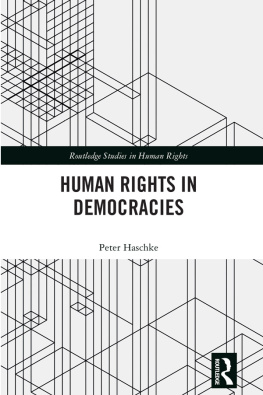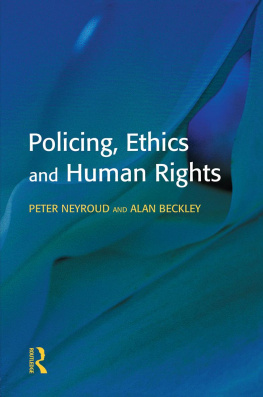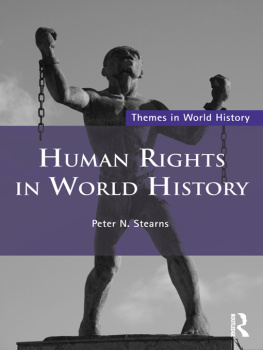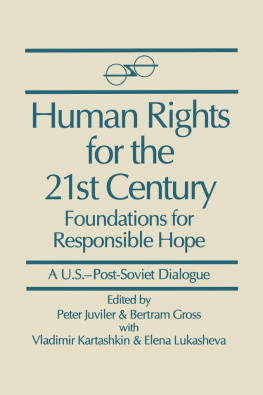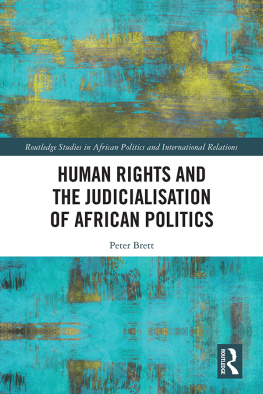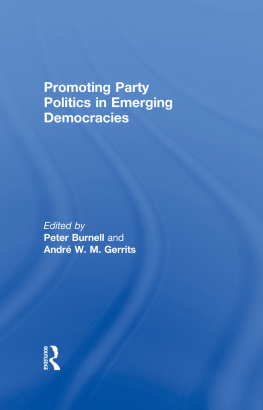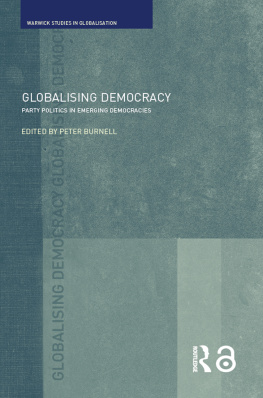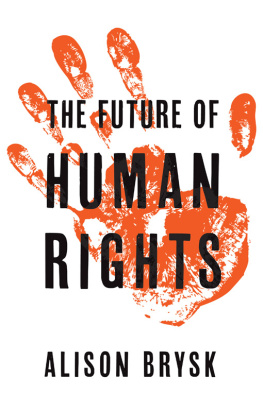Human Rights in Democracies
Violations of the right to the physical integrity of the person, such as torture, cruel and unusual punishment, extra-judicial executions, disappearances, and political imprisonment have long been treated as an anomaly in democratically governed societies. In the current literature on human rights, violations of this right are by and large seen as the hallmark of autocratic and repressive regimes.
This study takes on this dominant paradigm and shows not only that the common assumption that democratic countries effectively limit human rights abuse is simply wrong, but that its widely accepted theory of what drives human rights violations accounts for only a small part of these abuses at best. Haschke shows that despite the increasing numbers of countries that are democracies, and despite growing numbers of national signatories to international treaties prohibiting human rights abuse, the number of allegations has not declined. This book also demonstrates that the bulk of this abuse, which takes the form of torture and ill-treatment, extra-judicial killings, rape, and the like, is committed against marginal members of society, seeming to reveal environments that enable agents of the state to abuse those with whom they are in contact. This violence is found in democracies and dictatorships alike.
This work will be of interest to students and scholars of international relations, human rights, and comparative politics.
Peter Haschke is Assistant Professor of Political Science at the University of North Carolina at Asheville.
Routledge Studies in Human Rights
Series Editors: Mark Gibney, UNC Asheville, USA, Thomas Gammeltoft-Hansen, The Danish Institute for Human Rights, Denmark and Bonny Ibhawoh, McMaster University, Canada
For more information about this series please visit: www.routledge.com/series/RSIHR
The Routledge Human Rights series publishes high quality and cross-disciplinary scholarship on topics of key importance in human rights today. In a world where human rights are both celebrated and contested, this series is committed to create stronger links between disciplines and explore new methodological and theoretical approaches in human rights research. Aimed towards both scholars and human rights professionals, the series strives to provide both critical analysis and policy-oriented research in an accessible form. The series welcomes work on specific human rights issues as well as on cross-cutting themes and institutional perspectives.
1Human Rights and the Dark Side of Globalisation
Transnational Law Enforcement and Migration Control
Edited by Thomas Gammeltoft-Hansen and Jens Vedsted-Hansen
2A Genealogy of the Torture Taboo
Jamal Barnes
3Sovereignty, State Failure and Human Rights
Petty Despots and Exemplary Villains
Neil Englehart
4Understanding Statelessness
Edited by Tendayi Bloom, Katherine Tonkiss and Phillip Cole
5Human Rights in Democracies
Peter Haschke
Human Rights in Democracies
Peter Haschke
First published 2018
by Routledge
2 Park Square, Milton Park, Abingdon, Oxon OX14 4RN
and by Routledge
711 Third Avenue, New York, NY 10017
Routledge is an imprint of the Taylor & Francis Group, an informa business
2018 Peter Haschke
The right of Peter Haschke to be identified as author of this work has been asserted by him in accordance with sections 77 and 78 of the Copyright, Designs and Patents Act 1988.
All rights reserved. No part of this book may be reprinted or reproduced or utilised in any form or by any electronic, mechanical, or other means, now known or hereafter invented, including photocopying and recording, or in any information storage or retrieval system, without permission in writing from the publishers.
Trademark notice: Product or corporate names may be trademarks or registered trademarks, and are used only for identification and explanation without intent to infringe.
British Library Cataloguing-in-Publication Data
A catalogue record for this book is available from the British Library
Library of Congress Cataloging-in-Publication Data
A catalog record for this title has been requested
ISBN: 978-1-138-06527-7 (hbk)
ISBN: 978-1-138-01929-4 (ebk)
Typeset in Times New Roman
by Apex CoVantage, LLC
On 31 March 2005, 29 people were killed in Baixada Fulminense district of Rio de Janeiro. The killings were attributed to a group, believed to consist of military police officers, who drove through Baixada Fulminense between 8:30 and 11pm, shooting randomly at passersby. Fourteen-year-old schoolboy Douglas Brasil de Paula was playing pinball in a bar when he was killed. Elizabeth Soares de Oliveira was working in her husbands bar when she was shot. Joo da Costa Magalhes was sitting at the door of his house when the gunmen fired on him, while Rafael da Silva Couto, a 17-year-old schoolboy, was cycling along the Via Dutra when he was shot dead.
Amnesty International, They Come in Shooting (2005)
The civil and human rights movements and reforms that swept across much of the developed world in the late 1960s and early 1970s, culminating in the near universal adoption of a host of binding civil and human rights conventions and treaties throughout the late 20th century, convinced many that the abuse of states coercive power, genocide, and repression were well on their way to democratic resolution. Yet, despite the development of internationally recognized human rights norms, the adoption and ratification of legally binding human rights treaties by the vast majority of United Nation membership, and despite the monitoring of states legal obligations by international organizations, state agencies, and non-governmental organizations, human rights continue to be violated worldwide with impunity. This book seeks to improve our understanding of why a specific subset of human rights namely, the human right to the physical integrity of the person is violated.
Why was Rafael da Silva Couto killed? Why are every year hundreds of thousands of men, women, and children like him raped in police stations; disappeared or arbitrarily detained; burned, electrocuted, and beaten in prisons; hacked to death or executed in the streets; brutalized and maimed in their homes or at work all at the hands of their own governments?
Political scientists have proposed a parsimonious answer: the most basic human right to the physical integrity of the person is violated when it is in the states interest. Challenges and opposition to the regime and to the political status quo demand a coercive and repressive response. Violations are prevented where the coercive power of the state is constrained, where leaders are held accountable, and where threats to national security and power are non-existent. Where leaders perceive threats to their tenure, to the regime, or the status quo, the coercive apparatus of the state is set into motion to eliminate these threats. Political challengers are imprisoned, critics of the regime harassed, intimidated, or worse killed. Protest is violently suppressed and rebels, insurgents, and other enemies of the state disappeared and/or tortured in prisons.
Threats to national security and leaders are believed to be a primary factor explaining violations of physical integrity rights. A similarly critical factor is the capacity of the state or of executives to order or sanction these coercive responses to threats. Where leaders are constrained and where repressive responses to threats are costly or difficult to implement, violations are less likely. The most heralded argument in this vein is Davenports (2007


